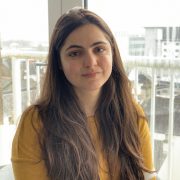The ATeam: Producing healthcare guidance for children with A-T including the exploration and design of a home-based exercise package

Research Project information
Principal researchers: Munira Khan & Dr Lisa Bunn
Institute: University of Plymouth
Cost: £71,902.91 over 36 months
Completion Date: August 2024
Project Overview
This project aimed to develop evidence-based guidance for healthcare professionals managing Ataxia Telangiectasia (A-T), focusing on nursing, physiotherapy, and occupational therapy. Historically, these disciplines have been integral to A-T management but lacked guiding research evidence. A large team of parents, academics and clinicians who are interested in A-T research was assembled to conduct this project and they named themselves ‘the ATeam’.
Research Methods and Outcome
Following a compilation of all available evidence that could guide the management of A-T (Khan et al., 2024) the ATeam co-designed:
- My A-T Pack: A child- and family-owned healthcare pack to support communication and care. Its design was informed by focus groups and iterative feedback, including live illustrations during sessions (and My A+ Pack: A version tailored for broader ataxia disability needs).
- A Home-Based Exercise Intervention
A flexible, remotely supported exercise program was co-developed to suit daily life demands and manage fatigue. This included Yoga adapted videos and co-produced a “breathing exercise movie” for use with the ‘Breather’ device aimed to enhance respiratory health. This intervention included mindfulness options to ensure participant inclusivity and reduce perceived failure risks.
A feasibility randomized controlled trial tested the intervention’s acceptability and effectiveness with seven participants. Four completed the program, reporting high enjoyment and perceived benefits. Engagement rates varied, and improvements were noted in balance and respiratory function.
This project developed and trialled the first non-medical therapy intervention for children and young persons with A-T, which, following amendment and rapid evaluation, will also be freely available to download freely for accessible use.
The project has advanced A-T care by addressing gaps in evidence and creating family-centred tools and interventions. Ongoing refinement and collaborations aim to scale its impact globally.
What next?
The ATeam’s complex intervention engaging online platforms for exercise demonstrates the potential of co-produced, inclusive interventions to improve the lives of children with A-T. It sets the stage for more robust, scalable research and clinical applications in the future, international collaboration and would be beneficial to enhance future trials.
Publications
Khan et al., The Cerebellum: “Care and Management of Children with A-T by Nurses and Allied Health Professionals.” https://doi.org/10.1007/s12311-023-01555-z
Manuscript on My A-T Pack under review.
Feasibility trial paper in preparation.





